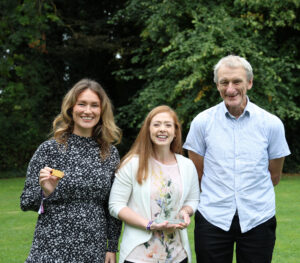By Samantha Carty, Momentum
In an interview with Marie Bourke (CEO) and Aoife Kelly (COO), the co-founders of Celtonn, we learn about their start-up to commercialise cutting-edge High-Frequency Millimeter Wave technology. Their innovative solutions are poised to revolutionise sectors including 6G, Aerospace, Autonomous Vehicles, and Civil/Space Radars.

Marie and Aoife, both seasoned professionals in the deep tech industry, bring over a decade of experience to their roles at Celtonn. Marie, with a strong background in the technical aspects of the industry, highlights the importance of their team’s deep understanding and long-term experience. “Our CTO has been in the industry for over 40 years. It takes that wealth of knowledge to get us where we want to be,” she adds.
Marie and Aoife provided insights into the unique challenges and processes involved in bringing deep tech innovations to market. Unlike software, their technology’s commercialisation starts with chip development. “The chips are fabricated externally, and then we design a housing, integrate, assemble, and test them on-site before sending them to customers,” Marie explains. This process, though standard for hardware, highlights the significant initial investment and expertise required.
One of the major bottlenecks they face is the hesitance of investors towards hardware due to perceived risks and longer return on investment timelines. “Investors seem to be more comfortable with software where returns are quicker,” Marie notes. This challenge is compounded by the complex validation process necessary for their technology, which often involves collaboration with key industry players like the European Space Agency (ESA).
Funding remains a critical driver for Celtonn’s success. The co-founders shared the role of ESA in supporting the development of their V-band project. “ESA’s approach to fund and develop cutting-edge technology before scaling is crucial for us,” Marie explains. This funding model allows Celtonn to test and validate their technology, paving the way for future commercial applications.
However, securing funds is not without its challenges. Programs like the EIC Accelerator, while appropriate, are time-intensive and costly for SMEs. “The application process can cost up to €20k, and there’s no guarantee of funding,” Marie points out. This reality makes it imperative for deep tech companies to have robust financial strategies and seek diverse funding avenues.
The path to commercialising deep tech innovations has barriers and challenges. One is the gap between technical expertise and commercial acumen. “There’s often a disconnect between engineers focused on research and the commercial side of bringing a product to market,” Aoife explains. This gap underscores the need for a blend of entrepreneurial spirit and technical knowledge within the team. Additionally, the talent pipeline in Ireland poses a concern. “Universities aren’t producing the type of engineers we need,” Marie observes. This issue necessitates a focus on enhancing tech-entrepreneurship training and creating opportunities for undergraduates to engage in commercialisation projects.
For deep tech ventures like Celtonn, certain key elements are essential for success. A strong financial function, a mix of technical and commercial skills within the team, and effective funding support are critical. Looking ahead, Marie and Aoife are optimistic about Celtonn’s potential and are fully aware of the complexities and rewards of bringing groundbreaking technology to market. As they navigate the challenges of funding, talent acquisition, and commercialisation, their story serves as an inspiration for other deep tech entrepreneurs.
